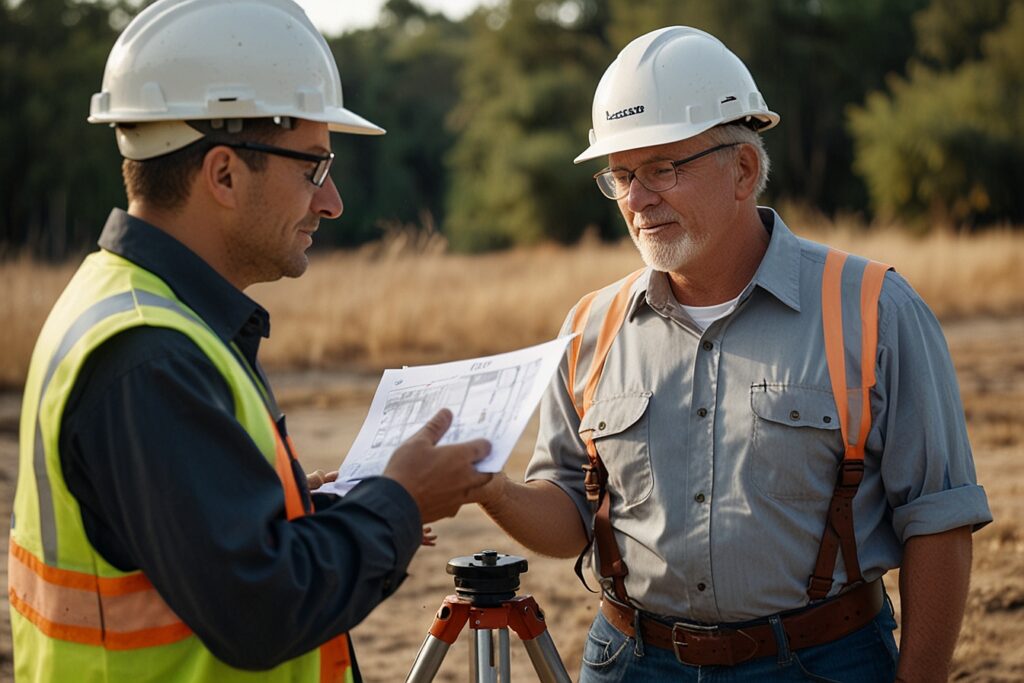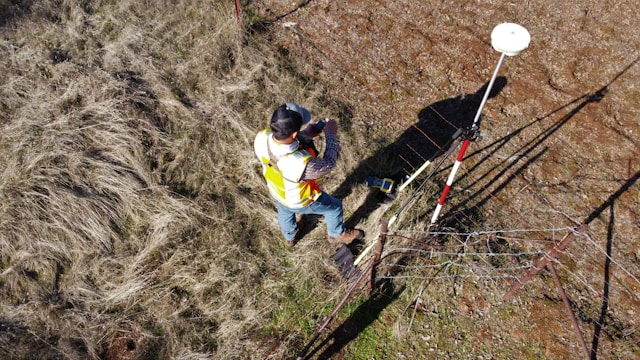The Importance of Land Title Surveys: Everything You Need to Know
 Are you purchasing a new property? Or perhaps you are planning to construct a building on a plot of land? In either case, it is crucial to understand the importance of land title surveys. These surveys are an essential part of any real estate transaction, providing crucial information about the property boundaries and ownership rights.
Are you purchasing a new property? Or perhaps you are planning to construct a building on a plot of land? In either case, it is crucial to understand the importance of land title surveys. These surveys are an essential part of any real estate transaction, providing crucial information about the property boundaries and ownership rights.
In this article, we will delve into everything you need to know about land title surveys. We will explore why these surveys are necessary, what they entail, and how they can protect your interests as a buyer or property owner. Whether you are a first-time buyer or an experienced investor, understanding the ins and outs of land title surveys will give you peace of mind and help ensure a smooth and secure transaction.
Join us as we uncover the importance of land title surveys and how they play a vital role in the real estate industry. By the end of this article, you will have a comprehensive understanding of why these surveys are vital for every property buyer and owner.
What is a land title survey?
A land title survey, also known as a boundary survey, is a detailed examination and mapping of a property’s boundaries. It is conducted by a professional land surveyor who specializes in determining property lines and accurately identifying the dimensions and features of a piece of land.
The purpose of a land title survey is to establish the legal boundaries of a property and determine any encroachments or discrepancies that may exist. This survey provides an accurate depiction of the property’s size, shape, and location, which is crucial for various reasons, including property ownership, development, and construction.
 Land title surveys typically involve research into historical documents, such as deeds and plats, to gather information about the property’s boundaries. The surveyor then physically measures the property using advanced equipment, such as GPS technology and total stations, to map out the boundaries and identify any potential issues.
Land title surveys typically involve research into historical documents, such as deeds and plats, to gather information about the property’s boundaries. The surveyor then physically measures the property using advanced equipment, such as GPS technology and total stations, to map out the boundaries and identify any potential issues.
A land title survey is a comprehensive process that requires expertise and precision, ensuring that the property lines are accurately depicted on the survey map. It is an essential step in any real estate transaction, as it provides a clear understanding of the property’s boundaries and ownership rights.
The role of land title surveys in real estate transactions
Land title surveys play a crucial role in real estate transactions, providing vital information to both buyers and sellers. For buyers, a land title survey helps ensure that the property they are purchasing aligns with their expectations and any representations made by the seller.
By conducting a land title survey, buyers can verify the property’s boundaries and confirm that there are no encroachments or boundary disputes that could affect their use and enjoyment of the land. This survey also provides valuable insights into the property’s topography, easements, and other physical features that may impact future development plans.
For sellers, a land title survey can help avoid potential legal issues and disputes. By having a professional survey conducted before listing the property, sellers can identify and address any boundary discrepancies or encroachments, ensuring a smooth and transparent transaction.
Additionally, a land title survey can be beneficial for lenders who require an accurate representation of the property’s boundaries and value before approving a loan. This survey provides valuable information that lenders can use to assess the property’s marketability and determine the loan amount.
In summary, land title surveys are essential in real estate transactions as they provide clarity and transparency regarding property boundaries, helping buyers, sellers, and lenders make informed decisions.
The importance of accurate land boundaries
 Accurate land boundaries are of utmost importance in any property transaction. They define the legal limits of a property and help establish the rights and responsibilities of the owner. Without accurate boundaries, disputes can arise, leading to costly legal battles and potential loss of property rights.
Accurate land boundaries are of utmost importance in any property transaction. They define the legal limits of a property and help establish the rights and responsibilities of the owner. Without accurate boundaries, disputes can arise, leading to costly legal battles and potential loss of property rights.
Land title surveys ensure that the property boundaries are accurately depicted on the survey map, providing a clear understanding of the property’s limits. This information is crucial for property owners, as it helps them determine what they legally own and where their rights end.
Accurate land boundaries also help prevent encroachments, which occur when a structure or improvement, such as a fence or building, extends beyond the property’s boundaries and onto a neighboring property. Encroachments can lead to conflicts with neighbors and potential legal actions, which can be avoided by conducting a land title survey.
Moreover, accurate land boundaries can impact property values. Buyers are often willing to pay a premium for properties with well-defined boundaries, as it provides certainty and security regarding the property’s size and ownership. On the other hand, properties with ambiguous or disputed boundaries may face challenges in the market and may be subject to price negotiations or even potential buyers backing out of the transaction.
In summary, accurate land boundaries are essential for property owners as they define ownership rights, prevent conflicts with neighbors, and can impact property values. A land title survey is the key to ensuring accurate boundaries and protecting your interests as a property owner.
Common issues discovered through land title surveys
Land title surveys can uncover a variety of issues that may not be immediately evident to the naked eye. These issues can have significant implications for property owners and potential buyers. Let’s explore some of the common issues that can be discovered through land title surveys.
- Boundary Disputes: Land title surveys can reveal boundary discrepancies or encroachments, which can lead to disputes between neighboring property owners. These disputes may require legal intervention to resolve and can be costly and time-consuming.
- Easements: An easement is a legal right to use a portion of another person’s property for a specific purpose. Land title surveys can identify existing easements, such as utility lines or rights of way, which may limit the property owner’s full use and control of the land.
- Zoning Restrictions: Land title surveys can help determine if a property is subject to any zoning restrictions or regulations. Zoning restrictions can affect how the property can be used and developed, which is crucial information for potential buyers or investors.
- Encroachments: As mentioned earlier, land title surveys can identify encroachments, which occur when a structure or improvement extends beyond the property boundaries. Encroachments can lead to legal disputes and potential loss of property rights.
- Flood Zones: Land title surveys can identify if a property is located within a designated flood zone. This information is crucial for property owners and buyers, as it may affect insurance requirements and potential risks associated with flooding.
These are just a few examples of the issues that land title surveys can uncover. By conducting a thorough survey, property owners and buyers can address these issues proactively and make informed decisions regarding the property.
The process of conducting a land title survey
The process of conducting a land title survey involves several steps to ensure accuracy and completeness. Let’s take a closer look at the typical steps involved in a land title survey.
- Research: The surveyor begins by researching historical documents, such as deeds, plats, and previous surveys, to gather information about the property’s boundaries and any potential encumbrances or easements. This research helps establish the starting point for the survey.
- Fieldwork: Once the necessary research is complete, the surveyor visits the property to physically measure and map out the boundaries. Advanced equipment, such as GPS technology and total stations, is used to accurately measure distances and angles.
- Boundary Markers: As part of the fieldwork, the surveyor may place boundary markers at key points along the property lines. These markers serve as a visual representation of the boundaries and can help prevent future disputes or encroachments.
- Data Analysis: After the fieldwork is complete, the surveyor analyzes the collected data to create an accurate survey map. This map includes detailed information about the property’s boundaries, dimensions, and any relevant features or encumbrances.
- Report Preparation: The surveyor prepares a comprehensive report that summarizes the findings of the land title survey. This report typically includes the survey map, a legal description of the property, and any relevant notes or observations made during the survey.
- Delivery and Review: The final step is the delivery of the survey report to the client, whether it be a buyer, seller, or lender. The client reviews the report to ensure that it aligns with their expectations and any representations made during the transaction.
It is important to note that the process may vary slightly depending on the specific requirements of the survey and the jurisdiction in which it is conducted. However, the overall objective remains the same: to provide an accurate depiction of the property’s boundaries and relevant information for the parties involved.
How land title surveys protect property owners
 Land title surveys provide crucial protection for property owners by offering a clear understanding of their property boundaries and ownership rights. Let’s explore some of the ways in which land title surveys protect property owners.
Land title surveys provide crucial protection for property owners by offering a clear understanding of their property boundaries and ownership rights. Let’s explore some of the ways in which land title surveys protect property owners.
- Boundary Clarity: Land title surveys establish the legal boundaries of a property, providing property owners with a clear understanding of what they own. This clarity helps prevent encroachments and boundary disputes, protecting the property owner’s rights and ensuring peaceful enjoyment of the land.
- Encroachment Identification: Land title surveys can identify any encroachments or boundary discrepancies that may exist. By uncovering these issues, property owners can take appropriate action to rectify the situation, such as negotiating with neighboring property owners or seeking legal remedies.
- Legal Compliance: Land title surveys ensure that the property is in compliance with applicable zoning regulations and restrictions. This compliance is crucial for property owners, as it helps prevent potential fines, penalties, or legal actions resulting from non-compliance.
- Property Value: Accurate land boundaries, as determined by land title surveys, can positively impact property values. Buyers are often willing to pay a premium for properties with well-defined boundaries, as it provides certainty and security regarding the property’s size and ownership.
- Development Planning: Land title surveys provide valuable information for property owners who plan to develop or build on their land. The survey maps and accompanying reports help property owners understand the property’s topography, easements, and other physical features that may impact their development plans.
In summary, land title surveys protect property owners by establishing clear boundaries, identifying encroachments, ensuring legal compliance, impacting property values, and aiding in development planning. These surveys provide valuable information that helps property owners make informed decisions and protect their interests.
The impact of land title surveys on property values
Land title surveys can have a significant impact on property values. Accurate land boundaries, as determined by these surveys, play a crucial role in determining the value of a property. Let’s explore the various ways in which land title surveys can impact property values.
- Certainty and Security: Properties with accurate land boundaries provide certainty and security for buyers, which can increase the perceived value of the property. Buyers are more willing to pay a premium for properties that have well-defined boundaries, as it eliminates any ambiguity or potential disputes regarding ownership.
- Avoidance of Legal Issues: By conducting a land title survey, property owners can identify and address any boundary discrepancies or encroachments before listing the property. This proactive approach helps avoid potential legal issues and disputes that may arise during the transaction, thereby preserving the property’s value.
- Marketability: Properties with accurate land boundaries are generally more marketable than those with unclear or disputed boundaries. Buyers are often attracted to properties that have well-defined boundaries, as it provides peace of mind and confidence in their investment.
- Development Potential: Land title surveys provide valuable information for property owners who plan to develop or build on their land. The survey maps and accompanying reports help property owners understand the property’s topography, easements, and other physical features that may impact their development plans. This knowledge can significantly impact the property’s value, as it allows for informed decision-making regarding development potential.
- Lender Confidence: Lenders often require accurate land boundaries and values before approving a loan. A land title survey provides the necessary information for lenders to assess the property’s marketability and determine the loan amount. This confidence from lenders can positively impact property values and facilitate smoother transactions.
In summary, land title surveys can have a positive impact on property values by providing certainty, avoiding legal issues, increasing marketability, unlocking development potential, and instilling confidence in lenders. These surveys are an essential tool for property owners and buyers alike, ensuring accurate valuations and protecting investment interests.
Hiring a professional land surveyor for your land title survey
When it comes to land title surveys, it is crucial to hire a professional land surveyor with the necessary expertise and credentials. A professional surveyor will ensure that the survey is conducted accurately and in accordance with industry standards and legal requirements.
Here are some important factors to consider when hiring a professional land surveyor for your land title survey:
- Experience and Expertise: Look for a surveyor with extensive experience in conducting land title surveys. Their expertise and knowledge will ensure that the survey is conducted accurately and efficiently.
- Licensing and Certification: Check if the surveyor is licensed and certified by the appropriate regulatory body in your jurisdiction. This ensures that they have met the necessary qualifications and adhere to professional standards.
- Reputation and References: Research the surveyor’s reputation in the industry and ask for references from previous clients. This will give you insights into their professionalism, reliability, and the quality of their work.
- Insurance Coverage: Ensure that the surveyor carries professional liability insurance to protect both parties in case of errors or omissions during the survey process.
- Cost and Timeline: Obtain quotes from multiple surveyors and compare their costs and timelines. However, keep in mind that the lowest price may not always guarantee the best quality. It is important to strike a balance between cost and quality when selecting a surveyor.
By hiring a professional land surveyor, you can have confidence in the accuracy and reliability of your land title survey. Their expertise and attention to detail will help ensure a smooth and secure real estate transaction.
Conclusion: The significance of land title surveys in property ownership and development
In conclusion, land title surveys are crucial for property buyers and owners as they provide accurate information about property boundaries and ownership rights. These surveys play a vital role in real estate transactions, ensuring transparency, preventing disputes, and protecting property values.
Accurate land boundaries are of utmost importance as they define ownership rights, prevent conflicts with neighbors, and impact property values. Land title surveys uncover common issues such as boundary disputes, easements, zoning restrictions, encroachments, and flood zones, allowing property owners to address these issues proactively.
Keith Maxwell Is a licensed surveyor in multiple states and has completed numerous title surveys for both residential and commercial properties.
